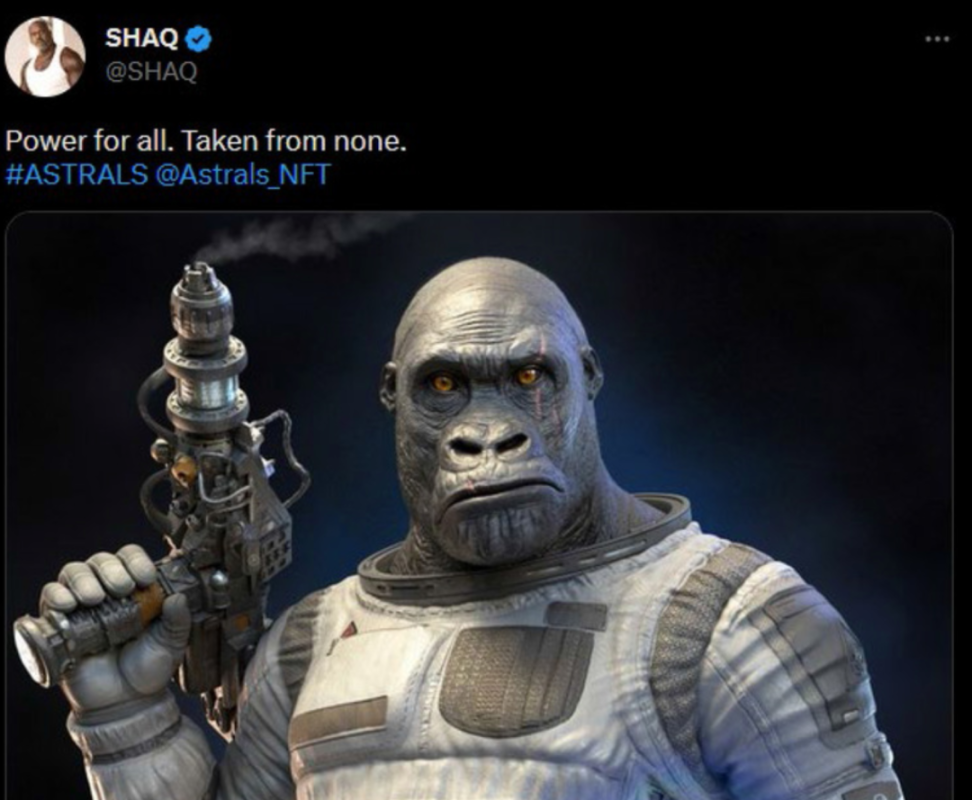This article will delve into the legal issues behind this case and explore the compliance challenges that celebrities may face when promoting the cryptocurrency sector.
Written by: Aiying

In recent years, the rapid expansion of the Web3 sector has not only brought about the convergence of technology and finance but has also sparked a wave of legal regulation globally. From the craze of NFT projects to the rise of Dogecoin to the peak of public discourse, star projects in blockchain are continuously entering the public eye. However, behind these shining examples, the shadows of compliance and law are closing in. Recently, former NBA star Shaquille O'Neal faced a class-action lawsuit for promoting the NFT project Astrals and the Galaxy token, revealing the complex legal risks in the Web3 world. This article will delve into the legal issues behind this case and explore the compliance challenges that celebrities may face when promoting the cryptocurrency sector.
I. The O'Neal Case: Settlement Agreement and Uncertain Legal Boundaries
This year, Shaquille O'Neal faced a class-action lawsuit in a federal court in Florida due to his active promotion of Astrals NFT and Galaxy tokens on social media. According to publicly available court documents, O'Neal and the company behind Astrals have agreed to pay $11 million for the settlement, which will be used to cover the plaintiffs' attorney fees and compensate affected NFT and token purchasers. While the settlement agreement resolves the immediate risks of the lawsuit, it also draws our attention to a deeper issue: Do these NFTs and tokens actually qualify as securities?

The applicability of U.S. securities law remains the focal point of such cases. According to the Securities Act of 1933, any investment contract involving public funds with the expectation of profits derived from the efforts of others may be considered a security. In the Astrals case, did investors purchase NFTs or Galaxy tokens with the expectation of financial returns? Did O'Neal and the project team fail to clearly disclose the risks associated with the project in their promotions? The answers to these questions directly impact the legal status of NFTs and tokens. However, the settlement means that this issue has not been judicially determined but has ended in a compromise between the parties. Thus, the legal definition of whether NFTs qualify as securities remains unresolved, leaving uncertain risks for similar projects in the future.
II. Legal and Ethical Responsibilities of Celebrity Endorsements
The phenomenon of celebrities endorsing cryptocurrency projects is not new, but in recent years, similar actions by well-known figures like Kim Kardashian have drawn significant public and regulatory scrutiny due to fines imposed. For celebrities, promoting cryptocurrency and NFT projects is both an opportunity and a trap: on one hand, they leverage their immense influence to gain widespread exposure for projects, attracting numerous investors; on the other hand, if these endorsed projects carry compliance risks, these endorsers may face accusations of market manipulation, misleading advertising, and unregistered securities.
In O'Neal's case, the class-action lawsuit in Florida accuses him of failing to clearly state the associated risks in his promotions, even intentionally misleading the public. Although the settlement agreement avoids direct legal penalties against O'Neal personally, it serves as a warning to all celebrities and project teams involved in the Web3 sector. For seemingly glamorous promotional activities, if there are undisclosed interests behind them, celebrities will face compliance responsibilities and a serious crisis of public trust.
III. Do Musk and Dogecoin Face the Same Risks?
Similar to O'Neal, Elon Musk has garnered widespread attention for his frequent promotion of Dogecoin on social media. As one of the most influential figures in the world, Musk's tweets can directly impact the price fluctuations of cryptocurrencies. In 2023, due to the price volatility of Dogecoin, Musk was accused by some investors of market manipulation, leading to a class-action lawsuit. However, unlike Astrals and Galaxy tokens, Dogecoin is more often viewed as a payment tool rather than a security, thus not meeting the traditional standards for legal classification as a security.
The risk of market manipulation always exists. When celebrities post content that may influence investment decisions, regulators will closely monitor whether they have subjective motives to manipulate the market, especially in a "Pump and Dump" scenario. If a celebrity publicly supports a cryptocurrency on social media and it is discovered that this was done to profit from selling their own holdings, they could very well face accusations of market manipulation. While Musk discusses Dogecoin with humor and personal interest, his actions undoubtedly set a precedent for future regulation, especially in the current context where the government holds significant power. Aiying has previously written a similar article; for details, please read "How Did Musk Navigate Allegations of Market Manipulation and Insider Trading with Dogecoin?"
IV. Future Compliance Outlook: Navigating the Regulatory Deep Waters
In recent years, NFTs and cryptocurrencies have attracted a large number of investors due to their innovation and potential high returns, but they have also faced criticism for their lack of regulation. The U.S. Securities and Exchange Commission (SEC) has filed charges against several NFT projects, indicating that regulators are gradually increasing scrutiny of this industry. Previous articles have mentioned that "Can Trump's Re-election Bring Real Regulatory Breakthroughs for the Cryptocurrency Industry?" mentioned that while the regulatory environment may become more flexible, it does not mean that cryptocurrency companies can completely escape legal constraints, especially those projects that still exhibit centralized characteristics, which may still face strict scrutiny.
In the future, Web3 project teams must invest more effort in compliance, especially for projects related to public investors. If tokens or NFTs are deemed securities, their issuance must comply with securities law requirements, including registration and transparent disclosure. For celebrity endorsers, promoting any Web3 asset requires careful examination of its compliance to avoid legal liability for failing to disclose business relationships or potential interests.
Case link: https://storage.courtlistener.com/recap/gov.uscourts.flsd.647550/gov.uscourts.flsd.647550.1.0.pdf
免责声明:本文章仅代表作者个人观点,不代表本平台的立场和观点。本文章仅供信息分享,不构成对任何人的任何投资建议。用户与作者之间的任何争议,与本平台无关。如网页中刊载的文章或图片涉及侵权,请提供相关的权利证明和身份证明发送邮件到support@aicoin.com,本平台相关工作人员将会进行核查。



